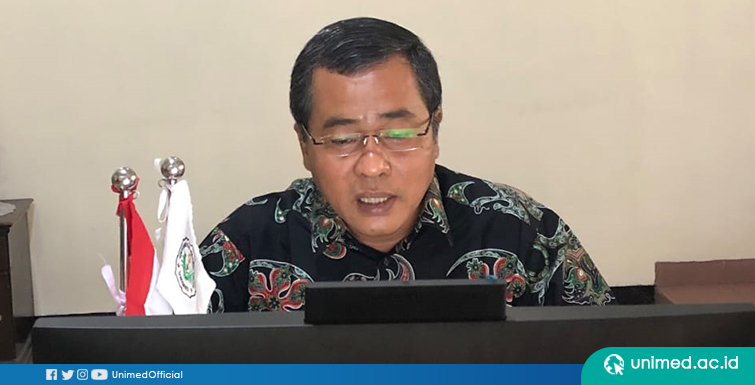FE Unimed held an Online Public Lecture with the theme “Bank Indonesia Policy Addressing the Impact of Co-19 on the Economy of North Sumatra” with guest speaker Wiwik Sisto Widayat Chief Representative of Bank Indonesia of North Sumatra Province online using Youtube streaming and Googlemeet with https: // fe link .unimed.in/ lecture general on Tuesday (4/14).
The impact of the Covid-19 Pandemic on economic growth is projected to be lower and slower than previously estimated, especially in North Sumatra. Therefore, academics and economic practitioners need to address this matter.
Unimed Rector Dr. Syamsul Gultom, SKM, M.Kes. said “When the Indonesian people and us together are focused on handling the spread of the Covid-19 Pandemic, we also must not neglect to keep learning, develop knowledge and take a role in society what we must do as academics. One manifestation of that role is the holding of FE Unimed’s public lecture activities online which we are currently participating in together. ”
Syamsul Gultom also thanked the Dean of FE for initiating this online public lecture, and thanks for Wiwik Sisto Widayat’s willingness to be a guest speaker, and also to all participants who had taken their time in the Covid-19 pandemic. this is to take part in this online general lecture. We are equally hopeful that this Unimed FE public lecture will benefit both us and all participants and have a positive impact on the North Sumatra BI and regional governments in policy making aimed at helping North Sumatra residents affected by Covid-19.
Wiwik said, “The impact of Covid-19 on the Indonesian economy provides a challenge in driving Indonesia’s economic growth. Economic growth is projected to be lower than previously estimated, BI will present 2 alternatives: 1.) Impact of MILD: if the assumption of world economic growth is 0.8% and China economic growth is 5%, it is likely that Indonesia’s economy in 2020 will be able to be pushed at 4.3% or 4.7%. and 2.) SEVERE Impact: the most affected are exports, exports which normally grow from 4 to 4.4 we estimate -5.6 to -5.2 this undesirable impact, then trade, retail and hospitality.
He continued, “Household consumption began to be depressed in the first quarter, various survey data illustrate the slowdown in household consumption which was confirmed by the decline in non-cash transactions in the form of debit ATMs, credit cards and electronic money. In addition, public expectations were allegedly also weakened reflected in the decline in several indices in the Bank Indonesia consumer survey. Related to the economic growth scenario, it is very hard for the North Sumatra economy in 2020, especially in the second quarter. From the external side, the volume of exports and imports has declined. By sector, almost all major (LU) business sectors experienced a decline. Then the hotel occupancy rate dropped to 80% in March, shopping activity declined along with limited community activity, a slowdown in the economy is expected to have an impact on increasing poverty in North Sumatra by 0.8% and the unemployment rate has the potential to nearly double. ”
The Head of the BI Provsu Representative explained the policy mix of the Indonesian bank in maintaining stability, and encouraged growth momentum in conducting a policy called the policy mix to make various efforts to reduce the impact of co-19. BI made changes in policies such as monetary policy, macroprudential policy, payment system policy, financial market deepening and sharia financial economy.
Dean of FE Prof. Indra Maipita, M.Sc., Ph.D. said the purpose of this online public lecture was as an effort to synergize lectures in class with the reality in the community. I really hope that the students of FE Unimed can be inspired by the presentation from the Head of the BI Provsu Representative that we invited in this public lecture. FE Unimed strives to produce reliable graduates in the fields of economics, business and economic education teachers. We hope that the graduates of FE Unimed must be ready to use in the world of work, when they can analyze economic problems, especially the impact of a co-19 pandemic on the economy. Therefore, we synergize between theoretical studies conducted in lectures with reality in society. We in this public lecture invited all Unimed FE lecturers and students, with the hope that the lecture activities carried out, could provide examples of cases in the world of work. Thus we can direct students to have theoretical and practical insights according to reality in the world of work. Hopefully this online public lecture can be beneficial for FE Unimed’s community members to continuously strive to realize the vision of forming graduates who excel in the fields of economic and business education.

